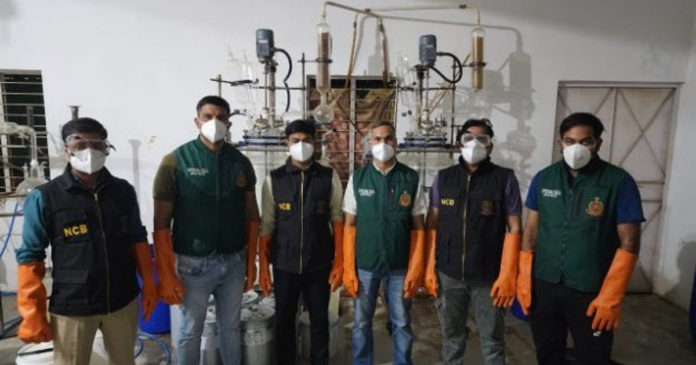In a stunning revelation, the Narcotics Control Bureau (NCB) and Delhi Police raided a meth lab in Uttar Pradesh‘s Kasna Industrial Area, uncovering ties to Mexico’s infamous drug cartel, the Jalisco New Generation Cartel (CJNG). The raid led to the seizure of 95 kilograms of methamphetamine, an illegal synthetic drug known for its high potency and profitability. Even more startling, a warden from Delhi’s Tihar Jail and a Delhi-based businessman were revealed to be instrumental in setting up the illicit operation.
A Global Crime Web: Mexican Cartel’s Reach in India
The meth lab busted in Gautam Buddh Nagar, Uttar Pradesh, has highlighted the extent of international drug cartels’ reach. The CJNG, infamous not only for its brutality but also for alleged practices like cannibalism during cartel training, has reportedly collaborated with Indian associates to establish this facility. The cartel’s involvement has raised serious concerns about India’s vulnerability to transnational drug syndicates seeking to expand their operations.
CJNG is known for its violent initiation practices, often requiring recruits to prove loyalty by committing extreme acts, including reported cases of cannibalism among failed trainees. The cartel’s connection to a meth lab in India signals a new level of involvement by foreign drug mafias in the region, raising alarms among law enforcement about the risks of increased cartel activity on Indian soil.

The Role of the Tihar Jail Warden and the Businessman
The investigation revealed that the Delhi-based businessman collaborated with the Tihar Jail warden to set up the meth lab, using their local influence and resources. This partnership provided the international cartel with an infrastructure that would otherwise be challenging to establish independently. The involvement of a law enforcement official like a Tihar Jail warden, who is meant to uphold justice, has amplified the public’s shock and concern.
A senior NCB official commented, “The connections here are both shocking and worrying. For a drug cartel as feared as the CJNG to operate with local support in India, especially with people from law enforcement involved, speaks to the potential threats facing our society.”
Methamphetamine Seizure and Operation Details
During the raid, authorities found a massive stockpile of methamphetamine worth several crores on the black market. This synthetic drug, known for its addictive properties and destructive effects on communities, was being produced in large quantities for distribution. The authorities believe that the lab was a part of a larger network intended to flood both Indian and international markets with the potent drug.
The operation, carried out with precision by NCB and Delhi Police, involved several weeks of tracking and intelligence gathering. Authorities were able to trace the origins of the meth lab to the Kasna Industrial Area, following a tip-off regarding suspicious activities in the region. Surveillance confirmed that the facility had all the hallmarks of an industrial drug manufacturing setup.
Growing Threat of International Cartels in India
This meth lab bust has highlighted a disturbing trend of international drug cartels seeking to establish footholds in India. With India’s population and its geographical positioning, the country is increasingly being targeted by foreign drug syndicates aiming to exploit the market for methamphetamine and other narcotics.
CJNG’s involvement in this operation is particularly concerning, as this cartel is one of the world’s most dangerous and organized criminal groups. Known for their violent methods and sophisticated networks, the cartel’s presence in India indicates a significant shift in global drug trade patterns.
What’s Next: Legal Action and Security Measures
The arrested individuals, including the Tihar Jail warden and the businessman, will face severe legal consequences under India’s stringent anti-drug laws. The NCB has stated that the investigation is ongoing, and they are working to identify other associates connected to the operation. International coordination with agencies targeting CJNG and similar cartels will be crucial in dismantling any remaining networks in India.
Local authorities are also pushing for enhanced security and oversight measures within law enforcement agencies to prevent the infiltration of cartel influence. There is a call for stricter background checks and internal monitoring within correctional institutions like Tihar Jail to ensure officials are not compromised.
A Call for Vigilance Against Rising Drug Networks
This shocking case serves as a wake-up call to the reality of global drug networks and their far-reaching influence. The collaboration between Indian nationals and one of the world’s most dangerous cartels underscores the need for heightened vigilance, stronger law enforcement measures, and a proactive approach to prevent such networks from taking root in India. As authorities work to bring justice to those involved, the case will hopefully serve as a deterrent to similar attempts in the future, safeguarding communities from the devastating effects of drug trafficking.

